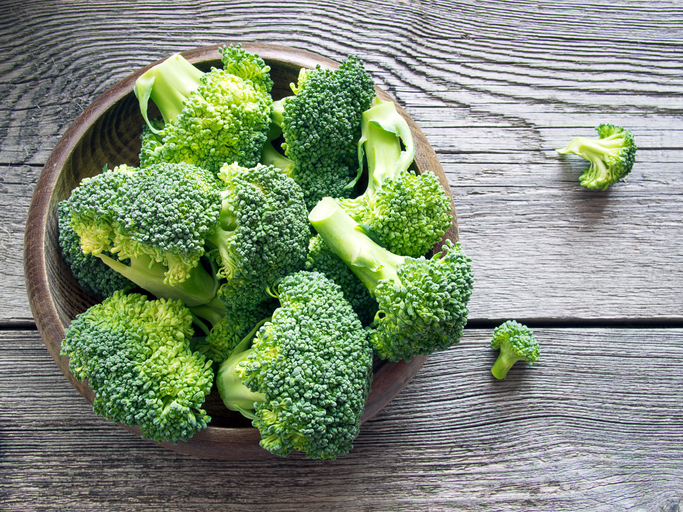According to Google, broccoli was number four of the 10 most searched words in 2016. If you are like me, you're probably wondering why? Could broccoli’s sudden rise to the top be attributed to its cancer-fighting compounds or rich vitamin content? I suspect the reason broccoli was trending may have more to do with the release of hip hop artist D.R.A.M’s “Broccoli” which peaked at number five on the US Billboard Hot 100 in 2016.
RELATED: Manage Your Diabetes By Going Vegan
Nonetheless, if you have diabetes you’ll be happy to know there is more to broccoli than the ability to launch careers. Broccoli contains an ingredient that may help people with type 2 diabetes improve their diabetes control.
A Nutrient Powerhouse
Broccoli is a cruciferous vegetable of the mustard family, which includes mustard greens, cabbage, cauliflower and Brussels sprouts. Cruciferous vegetables are rich in nutrients, including several carotenoids (beta-carotene, lutein, zeaxanthin); vitamins C, E, and K; folate; and minerals including potassium. They are also a good source of fiber.
Broccoli is also considered a nutrient dense food because it provides a lot of nutrients for a few calories. One cup chopped raw broccoli provides 100 % of your daily need for the vitamins and minerals as mentioned above – all for just 31 calories.
RELATED: The 10 Best Foods For Diabetes
Diabetes Management
Cruciferous vegetables contain a group of sulfur-containing chemicals known as glucosinolates. These chemicals are responsible for the strong aroma and bitter flavor of cruciferous vegetables. Glucosinolates are broken down by the body into isothiocyanates – which are antioxidants and powerful cancer-fighting chemicals. The main isothiocyanate found in broccoli is sulforaphane.
In a June 2017 study published in Science Translational Medicine, individuals with diabetes were given sulforaphane, provided as concentrated broccoli sprout extract. At the end of twelve weeks the study participants experienced a 10 percent reduction in fasting blood glucose and glycated hemoglobin (HbA1C). Moreover, participants in the study who were obese or who had higher glucose levels at the beginning of the study benefitted the most. Sulforaphane helped control blood glucose levels by reducing the amount of glucose produced by the liver.
RELATED: Diabetes Management: Why Black People Need a Trustworthy Doctor
Another way broccoli may help manage diabetes is by reducing oxidative stress.
Oxidative stress is the accumulation of destructive molecules called free radicals. Reducing these free radicals can reduce the development of insulin resistance – a major risk factor for type 2 diabetes. Scientific studies show a daily dose of five or 10 grams of broccoli sprout powder was associated with an increase in the total antioxidant capacity of the blood, and reductions in markers of oxidative stress.
Tips for Enjoying Broccoli
Although broccoli may be trending on Google, it is one of the least favorite vegetables of many. If you or your family are not big fans of broccoli, the following tips may help you purchase, store and prepare great tasting broccoli. After all, you don’t want to miss out on all of broccoli’s nutritional goodness.
- Choose odorless firm broccoli heads with tight, bluish green florets.
- Stalks should be clean and firm.
- Refrigerate unwashed broccoli in a plastic bag to prevent dehydration. Use within 3 – 5 days.
- Add chopped raw broccoli to your salad or wrap.
- Pair broccoli with pasta – hot or cold.
- Sauté chopped broccoli with minced garlic and olive oil.
- Enjoy a veggie slice of pizza or flat bread with chopped broccoli.
- Add chopped broccoli stalks to pasta sauce, soups and stews.
 Constance Brown-Riggs, MSEd, RD, CDE, CDN is a registered dietitian, certified diabetes educator, national speaker and author of The African American Guide to Living Well with Diabetes.. She is a Dannon One Yogurt Every Day Nutrition Advisor.
Constance Brown-Riggs, MSEd, RD, CDE, CDN is a registered dietitian, certified diabetes educator, national speaker and author of The African American Guide to Living Well with Diabetes.. She is a Dannon One Yogurt Every Day Nutrition Advisor.









